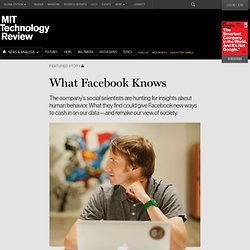

What Facebook Knows. Photographs by Leah Fasten If Facebook were a country, a conceit that founder Mark Zuckerberg has entertained in public, its 900 million members would make it the third largest in the world.

It would far outstrip any regime past or present in how intimately it records the lives of its citizens. Private conversations, family photos, and records of road trips, births, marriages, and deaths all stream into the company’s servers and lodge there. Facebook has collected the most extensive data set ever assembled on human social behavior. Your Laptop Can Now Analyze Big Data. Computer scientists from Carnegie Mellon University have devised a framework for running large-scale computations for tasks such as social network or Web search analysis efficiently on a single personal computer. The software could help developers working on many modern tasks: for example, designing a new recommendation engine using social network connections.
In order to make effective recommendations—“your friends liked this movie, so here is another movie that you haven’t seen yet, but you will probably like”—the software has to be able to analyze the connections between the members of a social network. This type of task is called graph computation, and it is increasingly common.
But working with large-scale data sets (such as online social networks) usually requires the processing horsepower of many computers clustered together, such as those offered by Amazon’s cloud-based EC2 service. “The scales of these problems will obviously keep growing,” says Guestrin. Is There Big Money in Big Data? Cut the nonsense: Peter Fader says a flood of consumer data collected from mobile devices may not help marketers as much as they think.

Few ideas hold more sway among entrepreneurs and investors these days than “Big Data.” The idea is that we are now collecting so much information about people from their online behavior and, especially, through their mobile phones that we can make increasingly specific predictions about how they will behave and what they will buy. But are those assumptions really true? One doubter is Peter Fader, codirector of the Wharton Customer Analytics Initiative at the University of Pennsylvania, where he is also a professor of marketing.
Fader shared some of his concerns in an interview with reporter Lee Gomes.